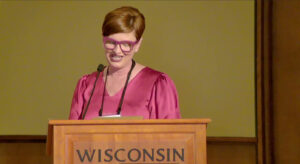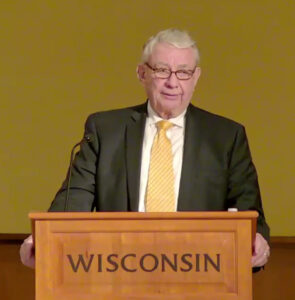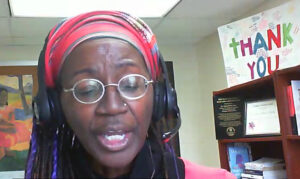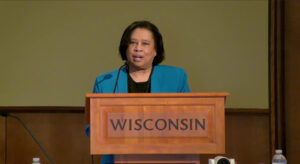MADISON, Wis. – In his final appearance before the Board of Regents, University of Wisconsin System President Tommy Thompson told Regents Friday that he will continue to champion the UW System, “the state’s greatest asset, other than its people.”
“While I am stepping down from the UW System next month, I am not stepping down from Wisconsin – and I will continue to do what I have always done,” Thompson said. “I will do whatever I can to make this state the best it can be. And that includes continuing to advocate for the University of Wisconsin.”
Thompson, the former four-term Wisconsin governor who has served as the interim president since July of 2020, announced last month that he will step down on March 18, 2022.
In recognition of Thompson’s significant contributions during his time in office, the Board voted unanimously Friday to remove the “interim” designation on his title, making Thompson officially the eighth UW System president.
Former Regent President Drew Petersen, who helped to recruit Thompson and presented him Friday with the Board’s official resolution of appreciation, said the decision to put Thompson at the helm following a failed presidential search and amid an escalating pandemic in the summer of 2020 was one based on mutual “trust and dedication.”
“When we made the decision, it was a difficult time. But we all knew it was the right decision,” Petersen said.
Thompson acknowledged that he came to the UW System with an ambitious agenda of things to accomplish – not just to “smash COVID” but to make the University of Wisconsin System even better.
He took the opportunity Friday to reflect on some of the challenges faced and accomplishments achieved.
Calling COVID-19 “a fierce and nasty foe,” Thompson said he is “deeply proud of how the UW has taken a stand and helped to beat down this insidious disease.” The cornerstone of UW System’s “Smash COVID” campaign has been a coordinated strategy of promoting a culture of responsibility, aggressive testing, tough safety protocols, and a vigorous campaign to encourage vaccinations.
“For much of the past semester, our positivity rates across the System hovered about 1 percent. Our campuses were, in fact, the safest places in Wisconsin,” Thompson said.
In November 2020, with support from the federal government, UW System became the first public university system in the country to expand its surge testing capacity to include the public, Thompson said. To date, the System has provided more than two million COVID tests in Wisconsin.
When vaccines became available, community vaccination clinics also were set up on campuses. While the UW System did not mandate vaccinations, its Vax Up! “70 for 70” scholarship initiative resulted in 11 of the 12 participating universities successfully reaching the target 70 percent student vaccination threshold. As a result, 70 vaccinated students at those universities each received a $7,000 scholarship.
Thompson said a major goal and major victory was bringing students safely back to campus and providing about 80% of undergraduate courses in person last fall – about equal to pre-pandemic levels. Thompson noted that in his travels around the state, he repeatedly heard students’ gratitude and enthusiasm for having their UW experience restored to something that looks much more like normal.
Thompson said another major challenge the UW successfully tackled was the enormous financial hit the universities were taking, largely as a result of the pandemic. Through a combination of employee furloughs, travel limitations, reduced expenses, and other measures, however, as well as the vital $50 million the UW System received from federal COVID funds, Thompson reminded Regents that he’d reported to them last October that every single university in the system is now financially stable.
He also noted that earlier this week, the Joint Finance Committee approved the UW’s $8 million request from the JFC supplemental fund, which will support initiatives including the Wisconsin Freshwater Collaborative, UW-Extension state agriculture specialists, Youth Programs, and collaborations between the federal Department of Defense and UW-Madison’s Nelson Institute for Environmental Studies as well as with a Water Council. The Committee also approved $5 million for the Higher Education Aids Board-administered loan program for nurse educators.
Looking back on his tenure as president, Thompson recapped some of the significant accomplishments of the past 20 months, including the hiring of new chancellors, restoring tuition-setting to the Board of Regents, getting a 2022-23 payplan for UW employees, and holding overall enrollment losses largely due to COVID to about 1 percent, half the national average.
Thompson also pointed to initiatives specifically targeted to students include:
- Expansion of the Summer Bridge program, to assist incoming freshmen to make a successful transition to college life;
- The launch of a new precollege pipeline initiative at 5 UW universities to foster greater interaction with high school students to encourage interest in going to college;
- The launch of the new Regents Opportunity Scholarships, providing $1 million annually in scholarships to underrepresented and deserving students;
- The waiver of electronic application fees at 10 of 13 universities, resulting in an increase in the number of applications;
- Signing of historic agreements between UW System and the Wisconsin Technical College System to make it easier for students to transfer between the two higher education systems;
- Introduction of a new online behavioral health tool, SilverCloud, that offers self-guided assistance programs to students, faculty, and staff at no cost;
- Creation of a new Equity, Diversity, and Inclusion office at the system level reporting directly to the president to facilitate a systemwide strategic vision and planning;
- The launch of a pilot program with EAB’s Academic Planner tool at several universities to facilitate better course-to-graduation mapping for students; and
- Bringing back precollege and youth programs to campuses.
As part of the UW’s commitment to best practices in financial processes and accountability, Thompson highlighted several key advances:
- Moving all UW System employees from a highly complicated, multi-track payroll system into a single payroll cycle;
- Updating job titles and descriptions for 22,000 non-faculty employees for the first time in 30 years as part of the Title and Total Compensation (TTC) program;
- Implementing Procure-to-Pay (P2P) and Shop-UW+, greatly improving efficiencies and reducing turnaround time on purchase order approvals from 10 days to a single day;
- Broadening the scope of the Administrative Transformation Program (ATP), an ambitious back-office overhaul to rebuild human resources, finance, and research administration systems and services, to include all UW institutions at once rather than a staggered rollout and calling for a three-year deadline for completion instead of five.
Reflecting the UW System’s commitment to the Wisconsin Idea, Thompson also pointed to several major areas where the University seeks to help address some of the state’s biggest challenges:
- Advocated for and received state support for 20 additional county-based agriculture positions in the Division of Extension at UW-Madison to further help support Wisconsin agriculture;
- Approved an historic new policy to develop strong, collaborative relationships between the UW System and the Native Nations in Wisconsin; and
- Advocated for increased efforts to educate people in prison and reduce recidivism. While the initiative was not funded in the current state budget, the University of Wisconsin Prison Education Initiative recently was awarded up to $5.7 million in grant funding to work with the Department of Corrections.
“We need to make clear to all that the University of Wisconsin System should not be considered an expenditure, but rather a vitally important investment in the future,” Thompson said. “If we truly want to grow Wisconsin, there’s no better place to start than with the UW System.
“At a time when the State continues to see surpluses at record levels, it’s time to think about record investments.”
Reiterating a message he has carried everywhere he goes, Thompson said, “I am wholeheartedly convinced that a college education, a college degree, has never been more important,” and he praised the System’s outstanding chancellors and UW faculty and staff across the state who “always put the best interests of the people of Wisconsin and the University at the center of what you do. I salute you and I thank you.”
“Educating students, building Wisconsin, and solving problems. That is what truly gives life to the Wisconsin Idea,” Thompson said.
In January, the Board unanimously approved Jay O. Rothman, chairman and CEO of the law firm Foley & Lardner LLP in Milwaukee, as the UW System’s next president. Rothman will begin on June 1, 2022. Former Regent Michael Falbo will serve as interim System president prior to Rothman’s arrival.
14th annual Diversity Awards winners recognized
The Board of Regents today honored the recipients of the 14th annual Regents’ Diversity Awards. These awards recognize individuals and programs that foster access and success for students who are members of historically underrepresented populations.
Regent Héctor Colón, chair of the Diversity Awards selection committee, said the award recipients make a lasting impact on their UW communities and beyond. “Their exceptional dedication to expanding opportunity supports success for students, faculty, and staff of all backgrounds,” he said.
Other members of the selection committee included Regents Tracey L. Klein, Ashok Rai, and Brianna Tucker.
This year’s winners include:
-
Individual: Dr. Rose-Marie Avin, Professor of Economics and Director of Women’s, Gender, and Sexuality Studies Program, UW-Eau Claire
Mentoring students and helping to create a sense of belonging are the cornerstone of her work, said Avin, who has devoted her 35-year career to promoting environments free from bias and discrimination.
“Mentoring students has been a lifelong passion,” she said, noting it’s particularly important for students who feel oppressed or marginalized in some way. “My work with students has always been to enhance their learning environment … and their empowerment.”
She said it’s just as important to give students a space where they have a sense of belonging.
“The most important thing I learned as director is the importance of creating a welcoming, inclusive, and nurturing environment for all of our students, physically creating a home away from home,” Avin said. “This leads to improved academic performance and potential graduation, but most of all to happy, healthy and engaged students.”
-
Individual: Barbara Stewart, Vice Chancellor for Diversity and Inclusion, UW-La Crosse
Stewart, the inaugural vice chancellor of a new Division of Diversity and Inclusion, has served at UW-La Crosse for more than 22 years. She is credited with bringing diversity-related offices together to increase student success and retention.
To reduce existing achievement gaps requires new and creative ways of looking at things, she said. “We need to reinvest and reenergize our commitment to precollege programs,” Stewart said. “Exposing young people to experiences they most likely don’t have will open the possibilities for something bigger.”
“During the pandemic, these students have lost precious time for their education. Once we demonstrate interest in children and demonstrate we care, they will choose us. We need to continue to create pathways for students to find us,” Stewart said.
“If the pandemic has taught us anything, we know we can scramble and we know what it takes to make things happen.”
-

Executive Director Franklin accepts award on behalf of the Pioneers Helping Pioneers Emergency Grant Program.
Program: Pioneers Helping Pioneers Emergency Grant Program, UW-Platteville
Providing essential emergency financial assistance to UW-Platteville students in need was the driving force behind the creation of the Pioneers Helping Pioneers Emergency Grant Program in 2020, using $2.55 million from federal Coronavirus Aid, Recovery, and Economic Security (CARES) Act funding, as well as $428,000 in donations through the UWP Foundation.
But Laura Franklin, UW-Platteville’s Diversity, Equity, and Inclusion executive director, says the program is about more than putting emergency funds into a student’s bank account. She said the program is “committed to providing not just financial support but also personalized, comprehensive support as well. We know when someone faces a financial crisis, other areas of life will be impacted as well.”
Franklin said the program is focused on operating “without judgment.” While the program prioritizes the needs of first-generation students and students of limited means, “We’re also steadfast that a financial emergency can happen to anyone at any time,” Franklin said.
Amid the COVID-19 pandemic, the program has helped more than 3,500 unique students over past two years.
“It’s been a labor of love and a privilege to be able to do this,” Franklin said.
In other business, the Regents:
- Approved a resolution of appreciation for UW-Madison’s hosting of the February 2022 Board of Regents meeting;
- Approved a $0 application fee for new undergraduate admissions, as established in December 2020, to all UW System universities excepting UW-Eau Claire, UW-La Crosse, and UW-Madison. These three universities will continue to charge undergraduate applicants their current fees of $25, $25, and $60 respectively, although they retain the right to waive undergraduate application fees for student who meet financial hardship conditions;
- Approved UW-Madison’s request for a Master of Science in School Psychology;
- Approved UW-Madison’s request for a Doctor of Philosophy in School Psychology;
- Approved UW-Madison’s request for a Bachelor of Arts and Bachelor of Science in Information Science;
- Approved UW-Milwaukee’s request for a Bachelor of Science in Data Analytics;
- Approved UW-Milwaukee’s request for a Master of Science in Data Science;
- Approved UW Oshkosh’s request for a Bachelor of Professional Studies in Leadership and Organizational Development;
- Approved UW Oshkosh’s request for an Executive Master of Business Administration;
- Approved UW-Whitewater’s request for a Bachelor of Arts and Bachelor of Science in Professional Writing and Publishing;
- Approved UW-Whitewater’s request for a Master of Science in Applied Kinesiology;
- Approved UW-Whitewater’s request for a Master of Science in Education in Early Childhood Education Policy;
- Approved UW-Milwaukee’s proposal to realign eight existing schools, colleges and their programs into four new colleges;
- Approved two new transfer programs between UW-Stevens Point and Northcentral Technical College: a Liberal Arts Transfer Program for the Associate of Arts in Liberal Arts and a Liberal Arts Transfer Program for the Associate of Science in Liberal Arts;
- Approved changes to Regent Policy Document 4-10, “Class Audit Policy;”
- Approved the UW System Status Report on Large or High-Risk Information Technology Projects;
- Approved the report on the Strategic Plans for Major Information Technology Projects;
- Approved an amendment to UW System’s agreement with Huron Consulting Group to assist with implementation of Workday software related to the Administrative Transformation Program;
- Approved an amendment to UW System’s contract with EAB Global, to purchase a new EAB product called Academic Planner, to be utilized by three institutions (UW Oshkosh, Platteville and River Falls) as a pilot program through 2023;
- Approved a UW-Madison sponsored research agreement with RxMapper, LLC;
- Approved a UW-Madison standard research agreement with eGenesis, Inc.;
- Approved UW-Madison’s clinical study agreement with Fate Therapeutics, Inc.;
- Approved UW-Madison’s request for authority to complete design and construction of the Biochemical Sciences Coon Lab;
- Approved UW-Madison’s request for authority to sell a 2.94-acre parcel of land at 6101 Mineral Point Road, the former site of the Veterinary Diagnostic Lab. The sale of this parcel is one of the first being considered for development by University Research Park (URP), with proceeds from any sale or ground lease of the parcel to be invested for the benefit of UW-Madison;
- Approved UW-Madison’s request for authority to sell a 5.76-acre parcel of land at 5707 Mineral Point Road at the north entrance to the URP;
- Approved UW-Madison’s request for authority to complete design and construction of the Rowe WHAM Plasma Physics Lab Electrical and Cooling Upgrade project; and
- Approved a new Regent Policy Document (RPD), “Youth Protection, Compliance, and Data Collection at UW System Institutions”.
The University of Wisconsin System Board of Regents will next meet on April 7-8, 2022, at UW-Stevens Point



